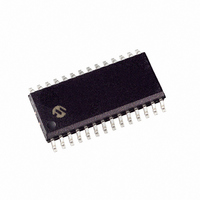DSPIC30F3013-30I/SO Microchip Technology, DSPIC30F3013-30I/SO Datasheet - Page 136

DSPIC30F3013-30I/SO
Manufacturer Part Number
DSPIC30F3013-30I/SO
Description
IC DSPIC MCU/DSP 24K 28SOIC
Manufacturer
Microchip Technology
Series
dsPIC™ 30Fr
Datasheets
1.DSPIC30F2011-20ISO.pdf
(210 pages)
2.DSPIC30F2011-20ISO.pdf
(6 pages)
3.DSPIC30F3012-20ISO.pdf
(14 pages)
4.DSPIC30F3012-20ISO.pdf
(20 pages)
5.DSPIC30F3014-30IP.pdf
(244 pages)
Specifications of DSPIC30F3013-30I/SO
Program Memory Type
FLASH
Program Memory Size
24KB (8K x 24)
Package / Case
28-SOIC (7.5mm Width)
Core Processor
dsPIC
Core Size
16-Bit
Speed
30 MIPs
Connectivity
I²C, SPI, UART/USART
Peripherals
Brown-out Detect/Reset, POR, PWM, WDT
Number Of I /o
20
Eeprom Size
1K x 8
Ram Size
2K x 8
Voltage - Supply (vcc/vdd)
2.5 V ~ 5.5 V
Data Converters
A/D 10x12b
Oscillator Type
Internal
Operating Temperature
-40°C ~ 85°C
Product
DSCs
Data Bus Width
16 bit
Processor Series
DSPIC30F
Core
dsPIC
Maximum Clock Frequency
30 MHz
Number Of Programmable I/os
30
Data Ram Size
2 KB
Maximum Operating Temperature
+ 85 C
Mounting Style
SMD/SMT
3rd Party Development Tools
52713-733, 52714-737, 53276-922, EWDSPIC
Development Tools By Supplier
PG164130, DV164035, DV244005, DV164005, PG164120, ICE4000, DM240002, DM300018, DM330011
Minimum Operating Temperature
- 40 C
Lead Free Status / RoHS Status
Lead free / RoHS Compliant
For Use With
XLT28SO-1 - SOCKET TRANSITION 28SOIC 300MILDV164005 - KIT ICD2 SIMPLE SUIT W/USB CABLE
Lead Free Status / Rohs Status
Lead free / RoHS Compliant
Other names
DSPIC30F301330ISO
Available stocks
Company
Part Number
Manufacturer
Quantity
Price
Company:
Part Number:
DSPIC30F3013-30I/SO
Manufacturer:
NSC
Quantity:
340
Part Number:
DSPIC30F3013-30I/SO
Manufacturer:
PIC
Quantity:
20 000
dsPIC30F
19.4
19.4.1
The CAN bus module has 3 receive buffers. However,
one of the receive buffers is always committed to mon-
itoring the bus for incoming messages. This buffer is
called the message assembly buffer (MAB). So there
are 2 receive buffers visible, RXB0 and RXB1, that can
essentially
message from the protocol engine.
All messages are assembled by the MAB, and are
transferred to the RXBn buffers only if the acceptance
filter criterion are met. When a message is received,
the RXnIF flag (CiINTF<0> or CiINRF<1>) will be set.
This bit can only be set by the module when a message
is received. The bit is cleared by the CPU when it has
completed processing the message in the buffer. If the
RXnIE bit (CiINTE<0> or CiINTE<1>) is set, an inter-
rupt will be generated when a message is received.
RXF0 and RXF1 filters with RXM0 mask are associated
with RXB0. The filters RXF2, RXF3, RXF4, and RXF5
and the mask RXM1 are associated with RXB1.
19.4.2
The message acceptance filters and masks are used to
determine if a message in the message assembly
buffer should be loaded into either of the receive buff-
ers. Once a valid message has been received into the
Message Assembly Buffer (MAB), the identifier fields of
the message are compared to the filter values. If there
is a match, that message will be loaded into the appro-
priate receive buffer.
The acceptance filter looks at incoming messages for
the RXIDE bit (CiRXnSID<0>) to determine how to
compare the identifiers. If the RXIDE bit is clear, the
message is a standard frame, and only filters with the
EXIDE bit (CiRXFnSID<0>) clear are compared. If the
RXIDE bit is set, the message is an extended frame,
and only filters with the EXIDE bit set are compared.
Configuring the RXM<1:0> bits to 01 or 10 can over-
ride the EXIDE bit.
DS70082G-page 134
Message Reception
RECEIVE BUFFERS
MESSAGE ACCEPTANCE FILTERS
instantaneously
receive
a
complete
Preliminary
19.4.3
The mask bits essentially determine which bits to apply
the filter to. If any mask bit is set to a zero, then that bit
will automatically be accepted regardless of the filter
bit. There are 2 programmable acceptance filter masks
associated with the receive buffers, one for each buffer.
19.4.4
An overrun condition occurs when the Message
Assembly Buffer (MAB) has assembled a valid
received message, the message is accepted through
the acceptance filters, and when the receive buffer
associated with the filter has not been designated as
clear of the previous message.
The overrun error flag, RXnOVR (CiINTF<15> or
CiINTF<14>) and the ERRIF bit (CiINTF<5>) will be set
and the message in the MAB will be discarded.
If the DBEN bit is clear, RXB1 and RXB0 operate inde-
pendently. When this is the case, a message intended
for RXB0 will not be diverted into RXB1 if RXB0 con-
tains an unread message and the RX0OVR bit will be
set.
If the DBEN bit is set, the overrun for RXB0 is handled
differently. If a valid message is received for RXB0 and
RXFUL = 1 indicates that RXB0 is full, and RXFUL = 0
indicates that RXB1 is empty, the message for RXB0
will be loaded into RXB1. An overrun error will not be
generated for RXB0. If a valid message is received for
RXB0 and RXFUL = 1, and RXFUL = 1 indicating that
both RXB0 and RXB1 are full, the message will be lost
and an overrun will be indicated for RXB1.
19.4.5
The CAN module will detect the following receive
errors:
• Cyclic Redundancy Check (CRC) Error
• Bit Stuffing Error
• Invalid message receive error
These receive errors do not generate an interrupt.
However, the receive error counter is incremented by
one in case one of these errors occur. The RXWAR bit
(CiINTF<9>) indicates that the Receive Error Counter
has reached the CPU warning limit of 96 and an
interrupt is generated.
MESSAGE ACCEPTANCE FILTER
MASKS
RECEIVE OVERRUN
RECEIVE ERRORS
2004 Microchip Technology Inc.























